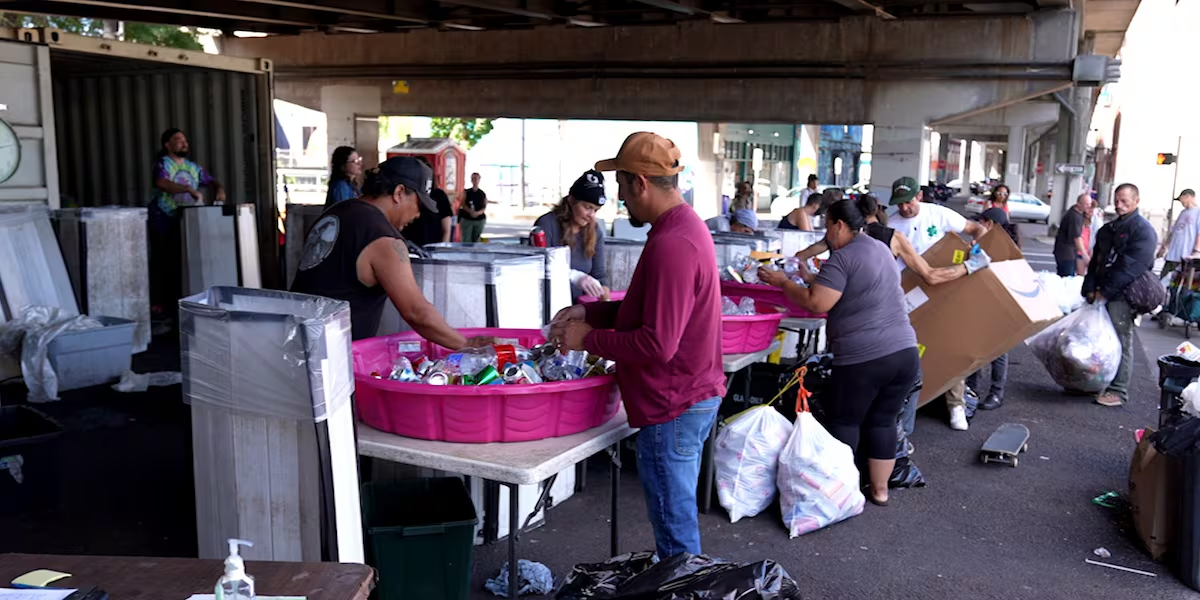Oregon’s well-known bottle return program is getting a major update, and at the heart of the changes are community-run redemption sites that serve Portland’s canners. While supporters say the shift creates more opportunities for people who rely on bottle returns for survival, some small businesses argue the new system puts an unfair burden on them.
Life at the People’s Depot
Under Portland’s Morrison Bridge, the People’s Depot operates as a lifeline for many. The site, managed by the Ground Score Association, hand-counts bottles and cans and pays out cash immediately. For those who depend on canning, every dollar matters.
“It’s what I do to survive out here,” said Gypsi Spirit, who relies on daily cash returns.
Also Read
The depot can hand-count up to 400 containers per person, roughly $40 in value. While it may seem modest, manager Kris Brown explained that such an amount can be crucial for survival. “$40 really is not that much in today’s society. But it matters a lot to people where that $40 is all they have,” Brown said.
The operation employs 10 workers—all former canners themselves—earning $20 an hour. Leaders say this shared background fosters trust and community.
Growth and Capacity Challenges
In 2023, the People’s Depot collected 9.5 million containers, about 6% of all cans and bottles returned in Portland. But organizers acknowledge they’ve hit capacity at their current site.
Thanks to a new state law, the depot can now apply for status as an official alternative redemption site, paving the way for a move into a permanent building by year’s end.
“Having a place with walls, with electricity, with some place for workers to wash their hands… we want to have a little bit more of an official site,” said Taylor Cass Talbott, executive director of the Ground Score Association.
Impact on Retailers
Once approved, the new facility will establish a three-mile “convenience zone.” Within that zone, large grocery stores can opt out of hand-counting bottles by paying a fee, part of which helps fund the depot.
“Retailers often times don’t want to take cans and bottles, but we really do,” Talbott said.
But not everyone is satisfied. Smaller chains like Plaid Pantry cannot opt out, even if they would prefer to shift responsibilities. CEO Jonathan Polonsky voiced frustration with the uneven rules.
“I have 107 stores, so I absolutely would not do it for the vast majority,” Polonsky explained. “But for this store… and three others, in a heartbeat. But you can’t do that.”
Polonsky acknowledged that the law lessens the overall redemption load for his business but said it leaves smaller retailers carrying the heaviest share. “If we’re going to go that far and make something totally different, let’s really rethink it,” he added.
What Stays the Same
For most Oregonians, bottle returns won’t feel any different. The green bag drop-off system at grocery stores and kiosks will continue as usual. The new rules only affect alternative sites like the People’s Depot, which aims to strengthen its role as both a recycling hub and a support system for Portland’s canner community.
Despite disagreements over policy details, there is broad recognition that these sites serve a vital purpose. As Polonsky himself admitted, “What they’re doing [is] awesome. If we can have more of them, that would be awesome.”












